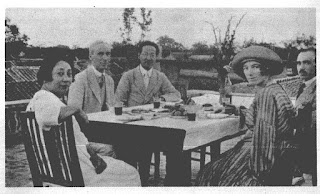NH: Can you tell me briefly where you come from and how long you've been in the UK?
Alicia Liu: I was born in
Beijing and moved to the UK to study in 2003. Although I considered myself a
Beijinger, my family was a mixture of northerners and southerners from China.
My dad was born in Inner Mongolia and my mum was born in Shanghai and grew up
in Beijing. My grandmother was originally from Guangzhou and grew up in Hong
Kong in the 1920s. I have fond memories of hearing her speaking a mixture of
Cantonese and Mandarin while growing up. Since moving to London as a teenager,
I've managed to spend an equal amount of my life in the East and the West.
NH: What is your company SingingGrass? (where did the
name come from?) and what are its main activities
AL: My company name was
inspired by the book The Grass is Singing
by the British author Doris Lessing. My grandfather, a renowned literary critic
and translator in China, had written the preface to the book when it was first
translated and introduced to China in the 1950s. One of my favourite quotes in
the book is "he knew how to get on
with natives; dealing with them was a sometimes amusing, sometimes annoying
game in which both sides followed certain unwritten rules."
I set up Singing Grass Communications in 2013 with the aim of guiding our clients in their engagement with China through arts, culture and lifestyle. We provide in-depth market research and insight, advise on business strategy and local partnerships for content brands such as the LEGO Group and international publishers such as Hachette Children's Group to maximise their potential in China. We also support international PR for important trade fairs such as Beijing International Book Fair and Shanghai International Children's Book Fair. (https://www.singinggrass.com)







